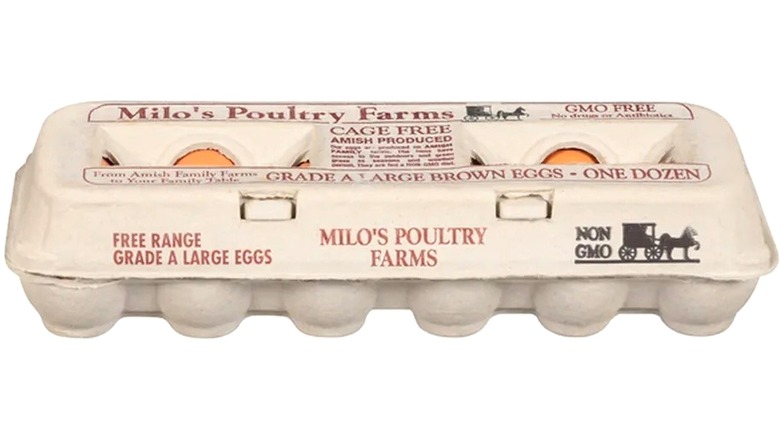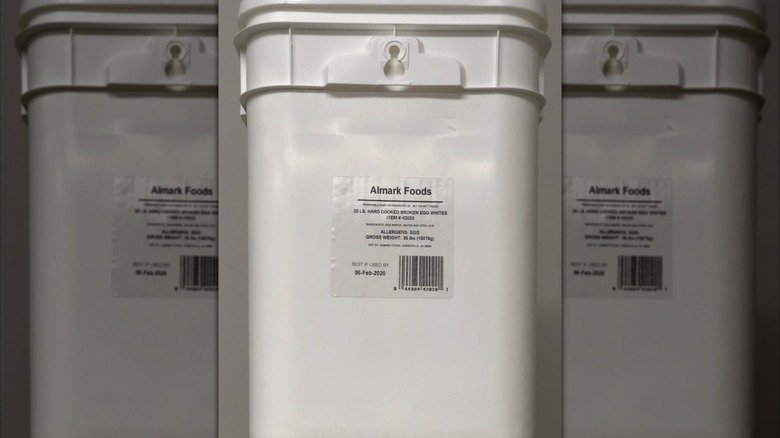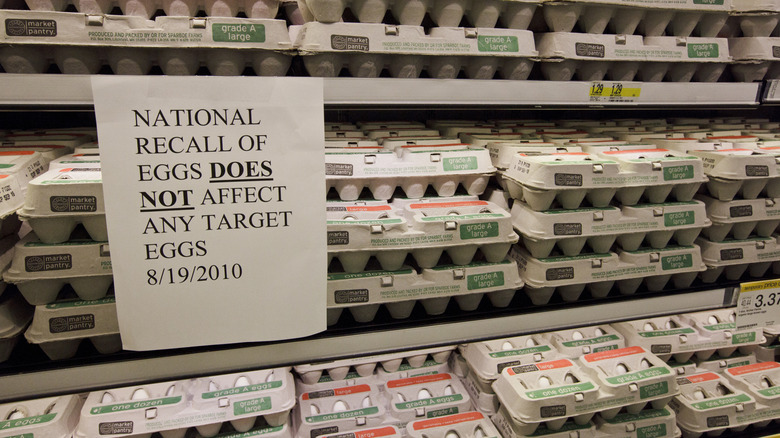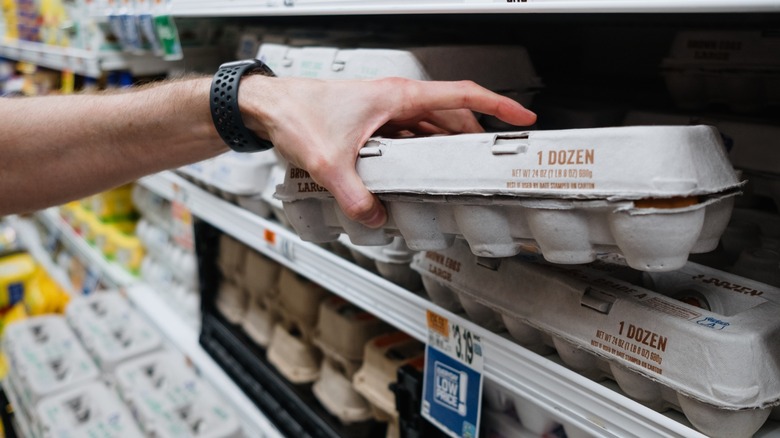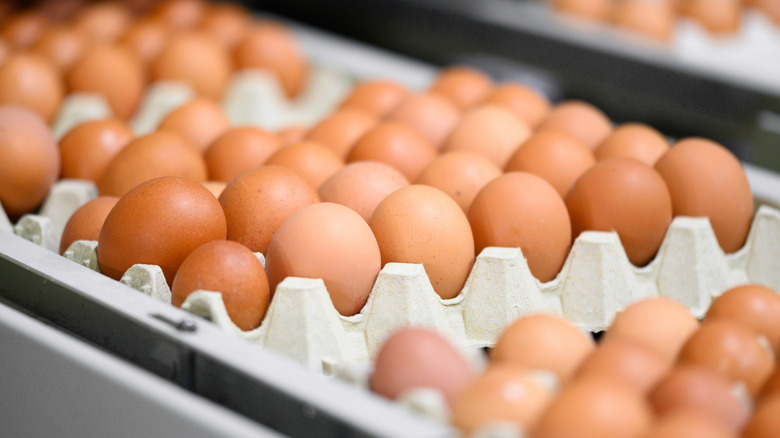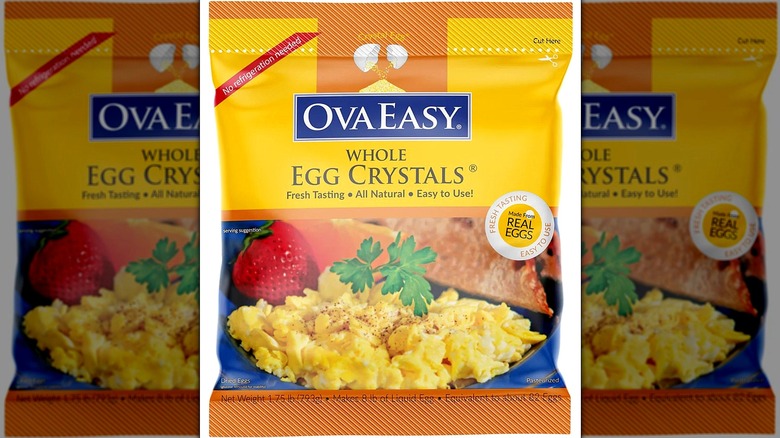The Absolute Worst Egg Recalls That Hit America
Eggs: They're one of the most common ingredients out there, and one of the riskiest too. When you handle, prepare, and store eggs correctly, they're completely safe — and the vast majority of the eggs in our grocery stores can be consumed without any fears. Unfortunately, though, there have been multiple occasions when that hasn't been the case, leading to some absolutely enormous recalls of eggs across the United States. In some situations, hundreds of millions of eggs have had to be tracked down by manufacturers and retailers, with dozens of people becoming seriously ill as a result of eating them.
The usual suspect when it comes to egg recalls is Salmonella contamination, due to the contact that the shells can have with bird droppings when they're laid. While they're normally scrubbed clean of Salmonella before they reach the store, there's no guarantee that it won't remain on the outside or get inside the shell, due to the chicken itself harboring bacteria. In other cases, eggs have been contaminated with Listeria, another common bacteria that can cause unpleasant food poisoning symptoms, with Listeria poisoning especially common with pre-cooked hard-boiled eggs.
In 2024, dozens of people were infected with Salmonella from contaminated eggs
We're commonly told that food has never been safer, thanks to continually evolving hygiene and safety practices. However, in recent years, and thanks to a few massive recalls, it's fair to say that peoples' trust in food safety has started to decline, as a survey conducted by Gallup shows. A 2024 egg recall is one such incident that may have eroded public faith in their food's hygiene, thanks to the sheer scale of it. The recall was announced on September 6, 2024 by Milo's Poultry Farms, due to a large outbreak of Salmonella associated with the company's eggs. In total, 93 people became infected with Salmonella as a result of eating the eggs, with 34 of those people being hospitalized.
The Milo's egg recall was made even more complicated and dangerous by the sheer timescale of illnesses associated with the eggs, and how widely they were distributed. Milo's Poultry Farms' eggs were sold under several brand names and distributed to both retailers and restaurants. The earliest illnesses were reported in May 2024, with people continuing to become ill all the way until September. In total, 12 states reported illnesses. After an investigation by the U.S. Food and Drug Administration, it was found that Salmonella was present both in the company's henhouse and in its packing facility.
Hard-boiled eggs produced by Almark Foods contained Listeria, prompting a huge recall
Pre-cooked hard-boiled eggs represent the height of convenience: Cut out the back-breaking work of boiling some water and boiling your eggs yourself and just get them straight from the store. In case you can't tell, we're being sarcastic — and honestly, we're right to be a little cynical of hard-boiled eggs, considering how risky they can be. In 2019 we were proved right, via an unfortunate recall issued by Almark Foods for all of the hard-boiled eggs produced at its Georgia-based factory. The food company announced the recall after the FDA notified it that its hard-boiled eggs had been linked to a Listeria outbreak and several illnesses that came after eating them. In total, seven people reported becoming sick, with one person sadly losing their life as a consequence of Listeria poisoning.
The FDA found Listeria in various parts of Almark Foods' facility, which could point towards the eggs becoming contaminated during their processing or packaging, and ultimately deemed the factory unsanitary. Almark Foods responded both by shutting down operations at the factory until it had solved the problem, and by hastily expanding its recall to cover basically all of the hard-boiled egg products it sold. This expansion was unfortunately too late for the people who had gotten ill, but it may well have prevented further sickness.
Over 200 million eggs were recalled due to Salmonella concerns
A lot of the time, food companies get away with their recalls being relatively small. That usually isn't the case when it comes to eggs — and in 2018 one of the biggest recalls of all time took place, following a Salmonella outbreak that infected nearly two dozen people. Investigations began when people started reporting becoming sick over the course of several months, with the FDA trying to track down the source of the infection. It ultimately determined that many of the illnesses had come from eggs that had been supplied by Rose Acre Farms, which then prompted the company to go into overdrive, issuing a recall.
Oh, and it was a big recall, folks. Well over 200 million eggs had to be recalled by the Indiana-based producer — an astonishingly large number spread over a wide geographical location. The eggs were supplied to grocery stores and restaurants in no less than nine different states. To make matters worse, they were sold under loads of different brand names, with even Walmart and Waffle House being affected as part of it. By mid-June of that year, the outbreak had subsided, but the damage had been done to Rose Acre Farms' reputation.
In 2010, 380 million eggs were recalled due to potential contamination
There are egg recalls, and then there's the egg recall of 2010. This legendary (for all the wrong reasons) recall remains the largest egg recall in history, and affected hundreds of people with Salmonella poisoning. The outbreak began in May 2010, and while states started to see Salmonella cases increasing gradually, things started fairly small. However, that wasn't the case for long, and by August several hundreds of people had reported illness, with the cases eventually being traced back to eggs produced by Wright County Egg and sold under over a dozen brand names.
The outbreak started just before new rules were introduced by the government which were designed to limit Salmonella outbreaks in eggs, which may have contributed to the wide scale of the problem. Wright County Egg originally responded by recalling 228 million eggs, but it quickly had to add more than 150 million eggs to that number to cover all the bases. A further investigation into the outbreak revealed that Wright County Egg's barns had been found to be containing Salmonella for up to two years prior to the outbreak, with the bacteria being found on dozens of individual occasions and during safety checks.
A Salmonella outbreak led to a 2016 recall
Egg recalls can often present a massive headache to manufacturers, who frequently supply their products to both supermarkets and restaurants and sell their eggs under multiple different brand names. This can lead to much wider issues and a higher chance of Salmonella outbreaks, as the Good Earth Egg Company discovered in 2016. The company had to recall a huge amount of its eggs after eight people tested positive for Salmonella in Illinois, Missouri, and Kansas. When the infections were traced back to the company, it knew it had to act immediately.
The problem was that its eggs had been sent pretty much everywhere. As well as restaurants and standard supermarkets, Good Earth Egg Company has also sold its eggs to institutions and wholesale outlets. While some product recalls only affect specific items within a brand's output, when it comes to eggs, they don't have that luxury — and sure enough, Good Earth Egg Company had to recall every single carton size it sold its eggs in. The company was keen to note that its eggs hadn't tested positive for Salmonella, and that it was conducting the recall because it was the morally right decision. We think it's fair to say that it looked like the likely culprit, though.
Dozens of illnesses led to a wide scale recall in 2018
Egg recalls tend to emerge pretty slowly over the period of a few months, with companies often only recalling their eggs once it's a little too late to avoid the majority of illnesses. This was the case back in 2018, when Gravel Ridge Farms had to recall its cage-free large eggs due to the potential presence of Salmonella. The company issued a recall notice for eggs with use-by dates from the end of July 2018, but didn't do so until the second week of September of that year. What's more, it was facing the unfortunate truth that folks might have become sick as far back as May 2018 as a result of eating its eggs.
Unfortunately, the scale of this recall when it comes to illness was pretty severe. By the time the recall was declared over, 44 people had been infected with Salmonella, with 12 of those people being hospitalized. However, it's entirely possible that hundreds more people might have become sick from eating these eggs. The U.S. Centers for Disease Control and Prevention estimates that only one in 30 cases of Salmonella are actually diagnosed as such, as a lot of people don't actually go to the doctor when they get ill with it. Luckily for Gravel Ridge Farms, the outbreak ended before anybody had become gravely sick, but it could have been way worse.
Over a million hard-boiled eggs were recalled due to potential Listeria
Eggs can be distributed far and wide across the country, which can create a major issue for food producers and distributors if things need to be recalled. In 2012, it was Michael Foods Inc.'s turn to learn this, when it had to recall its hard-boiled eggs due to Listeria concerns. The company had to track down more than a million hard-boiled eggs sold in large pails. The issue was that its eggs were distributed to well over half of the states in the country — 34 in total, with the eggs traveling to places on both the east and west coasts, and plenty of locations in between.
The headache for Michael Foods Inc. was that the eggs had traveled pretty far down supply lines once they had to be recalled. While some of its pails had been sold to institutions, others had been snapped up by manufacturers that may have then used them as ingredients in products. As such, the company had to put out recall notices for several salads sold in various delis and outlets. Pretty amazing how much drama a humble boiled egg can cause, huh?
Multiple Salmonella cases caused a recall of organic eggs
Organic eggs are super popular, and it's not hard to see why. These eggs are produced by hens who only consume non-GMO feed that has been untouched by pesticides or antibiotics, which leads customers to assume that opting for organic options will be healthier and wholesome. Unfortunately, though, organic produce can still be recalled, and it's still susceptible to bacteria like Salmonella. This was seen in 2011, when a half-dozen cases of Salmonella poisoning in Minnesota were traced back to organic eggs produced on a farm in the southern part of the state. The cases led to a recall of thousands of cartons of product, equating to a huge amount of eggs.
The farm responsible had supplied eggs to several different vendors spread over three states, which no doubt caused stress when it came to tracking them down. As the Salmonella cases were spread over a span of roughly six weeks, the producer had to work with a pretty wide time period, making things more complicated. This recall flagged the potential risk of organic food to cause food poisoning, with some studies (such as one published in the Journal of Food Protection) finding that organic food may be more likely to become contaminated with Salmonella. This could be due to the lack of proper procedures around the use of manure instead of fertilizers, which may lead to bacterial infection.
False lab results led to a recall of egg products
If food companies say that their products are safe, we sort of expect them to be safe. It's hardly an unreasonable ask, right? Sadly, that may not be the case every single time — and in 2014, a recall pointed out this unfortunate reality. The recall was announced by the Food Safety and Inspection Service (or FSIS) for products made by Nutriom LLC, a company that makes dehydrated egg products, after it was discovered that its items potentially contained Salmonella. Somewhat worryingly, the FSIS found out that Nutriom LLC may have falsely reported test results that said that its products didn't have any Salmonella when they were in fact contaminated, and pressed ahead with distributing its egg products all the same.
What was particularly notable about this recall was how much Nutriom LLC resisted it. While the company had issued the first recall in February, the FSIS had to step in and issue a further recall when it refused to include additional items. The FSIS then had to flex its muscle, stating that it would remove the products from circulation, until Nutriom LLC eventually started cooperating, recalling a wide variety of extra products.

